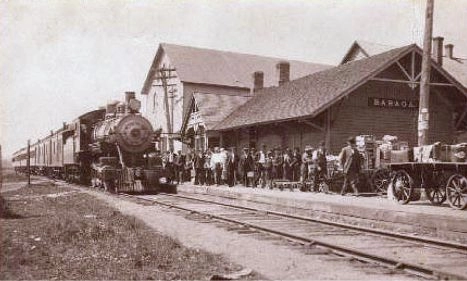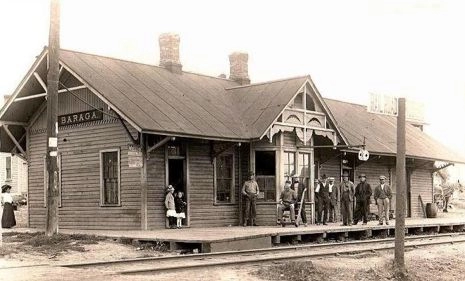- Details
- Hits: 3269
Station: Baraga, MI

 Baraga was founded in 1843, first called Bristol and later changed to Baraga. The Village was first located in Houghton County and then became a part of Baraga County when it was organized in 1875. [MPN] Baraga was a station stop on the Duluth, South Shore & Atlantic railroad.
Baraga was founded in 1843, first called Bristol and later changed to Baraga. The Village was first located in Houghton County and then became a part of Baraga County when it was organized in 1875. [MPN] Baraga was a station stop on the Duluth, South Shore & Atlantic railroad.
Photo info: Both photos of the DSS&A Baraga depot. Top [Alan Loftis collection]. Bottom, in the early 1900's [Paul Petoskey collection].
Notes
Time Line
1891. Much discussion about the proposed Baraga and Watersmeet railroad. This is apparently owned by the same Detroit investors which created the Huron Bay & Iron Range company. Milo Davis is now the chief engineer, same as the Huron Bay company.
1918. The DSS&A had an operator/agent here and an assistant during the day shift. [TRT]
1965. The Soo Line has been ordered by the MPSC to establish automatic flashing light signals within 120 days at the railroad crossing with US-41 in Baraga. The commission said the crossing is inadequately protected by a wigwag signal installed in 1922. [LDN-1965-0529]
1972. Some 100 tons of coal is on its way to the Keweenaw Bay Indian Reservation at Baraga in Michigan's upper peninsula. The 100 tons is part of a 750-ton coal pile belonging to the Arnold Ferry Line. It has been sitting useless on the island's dock since the company's two major coal customers, the Grand Hotel and Mackinac College, switched to oil.
Ferry line owner Otto Lang finally gave up looking for a buyer and offered to give the coal away if someone would just cart it off. Officials at the Keweenaw reservation, where coal is used for heat, got wind of Lang's offer and began looking for a way to transport the coal 200 miles from the island to the reservation. Derocher Dock and Dredge Co. of Cheboygan agreed to transport the coal from the island to the mainland at St. Ignace. The Soo Line agreed to pick it up and carry it across the upper peninsula to Baraga, where the Upper Peninsula Solid Forest Products offered free use of its rail siding facilities for unloading. All the transportation was free, which amounted to a $4,000 donation. The reservation would have taken more but they can only store 100 tons at a time. They hope to go back for more next summer. [LSJ-1972-1130]
Bibliography
The following sources are utilized in this website. [SOURCE-YEAR-MMDD-PG]:
- [AAB| = All Aboard!, by Willis Dunbar, Eerdmans Publishing, Grand Rapids ©1969.
- [AAN] = Alpena Argus newspaper.
- [AARQJ] = American Association of Railroads Quiz Jr. pamphlet. © 1956
- [AATHA] = Ann Arbor Railroad Technical and Historical Association newsletter "The Double A"
- [AB] = Information provided at Michigan History Conference from Andrew Bailey, Port Huron, MI

